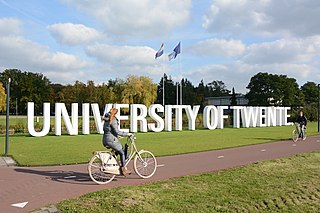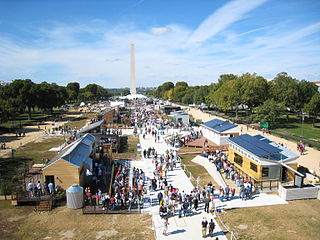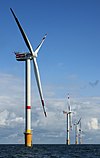
Delft is a city and municipality in the province of South Holland, Netherlands. It is located between Rotterdam, to the southeast, and The Hague, to the northwest. Together with them, it is a part of both the Rotterdam–The Hague metropolitan area and the Randstad.
The Eindhoven University of Technology, abbr. TU/e, is a public technical university in the Netherlands, situated in Eindhoven. In 2020–21, around 14,000 students were enrolled in its BSc and MSc programs and around 1350 students were enrolled in its PhD and EngD programs. In 2021, the TU/e employed around 3900 people.

Renewable energy is energy from renewable natural resources that are replenished on a human timescale. The most widely used renewable energy types are solar energy, wind power and hydropower. Bioenergy and geothermal power are also significant in some countries. Some also consider nuclear power a renewable power source, although this is controversial. Renewable energy installations can be large or small and are suited for both urban and rural areas. Renewable energy is often deployed together with further electrification. This has several benefits: electricity can move heat and vehicles efficiently, and is clean at the point of consumption. Variable renewable energy sources are those that have a fluctuating nature, such as wind power and solar power. In contrast, controllable renewable energy sources include dammed hydroelectricity, bioenergy, or geothermal power.

The University of Twente is a public technical university located in Enschede, Netherlands. The university has been placed in the top 170 universities in the world by multiple central ranking tables. In addition, the UT was ranked the best technical university in The Netherlands by Keuzegids Universiteiten, the most significant national university ranking. The UT collaborates with Delft University of Technology, Eindhoven University of Technology and the Wageningen University and Research Centre under the umbrella of 4TU and is also a partner in the European Consortium of Innovative Universities (ECIU).

The Delft University of Technology is the oldest and largest Dutch public technical university, located in Delft, The Netherlands. It specializes in engineering, technology, computing, design, and natural sciences.

The World Solar Challenge (WSC), since 2013 named Bridgestone World Solar Challenge, is an international event for solar powered cars driving 3000 kilometres through the Australian outback.

Nuna is the name of a series of crewed solar powered race cars that have won the World Solar Challenge in Australia seven times: in 2001, 2003, 2005, 2007, 2013, 2015 and 2017. The vehicles are built by students who are part of the "Brunel Solar Team" at the Delft University of Technology in the Netherlands, sponsored by Brunel.

The U.S. Department of Energy (DOE) Solar Decathlon is a collegiate competition, comprising 10 contests, that challenges student teams to design and build highly efficient and innovative buildings powered by renewable energy. The winners are selected based for the best blending of design architectural and engineering excellence with innovation, market potential, building efficiency, and smart energy production. In the summer of 2018, DOE merged its two student building design competitions into one Solar Decathlon competition.

Renewable energy progress in the European Union (EU) is driven by the European Commission's 2023 revision of the Renewable Energy Directive, which raises the EU's binding renewable energy target for 2030 to at least 42.5%, up from the previous target of 32%. Effective since November 20, 2023, across all EU countries, this directive aligns with broader climate objectives, including reducing greenhouse gas emissions by at least 55% by 2030 and achieving climate neutrality by 2050. Additionally, the Energy 2020 strategy exceeded its goals, with the EU achieving a 22.1% share of renewable energy in 2020, surpassing the 20% target.

China is the largest market in the world for both photovoltaics and solar thermal energy. China's photovoltaic industry began by making panels for satellites, and transitioned to the manufacture of domestic panels in the late 1990s. After substantial government incentives were introduced in 2011, China's solar power market grew dramatically: the country became the world's leading installer of photovoltaics in 2013. China surpassed Germany as the world's largest producer of photovoltaic energy in 2015, and became the first country to have over 100 GW of total installed photovoltaic capacity in 2017.

The use of solar energy began in Israel in the 1950s with the development by Levi Yissar of a solar water heater to address the energy shortages that plagued the new country. By 1967 around 5% of water of households were solar heated and 50,000 solar heaters had been sold. With the 1970s oil crisis, Harry Zvi Tabor developed the prototype of the solar water heater now used in over 90% of Israeli homes. There are over 1.3 million solar water heaters installed as a result of mandatory solar water heating regulations.
Rosenheim Technical University of Applied Sciences or TH Rosenheim is a university in Rosenheim, Germany with its main campus in Rosenheim and campuses in Mühldorf am Inn, Burghausen and Chiemgau. The TH Rosenheim is an hour's drive away from the Bavarian capital Munich and the Austrian city of Salzburg. The university's key areas of expertise are business, technology, design, healthcare and social studies. Established in 1971 the university is best known for its Faculty of Wood Engineering and Construction.

Missouri University of Science and Technology is a public research university in Rolla, Missouri. It is a member institution of the University of Missouri System. Most of its 6,456 students (2023) study engineering, business, sciences, and mathematics. Known primarily for its engineering school, Missouri S&T offers degree programs in business and management systems, information science and technology, sciences, social sciences, humanities, and arts. It is classified as a "STEM-dominant", R2 doctoral university with "high research activity".

Hyperloop is a proposed high-speed transportation system for both passengers and freight. The concept was documented by Elon Musk in a 2013 white paper, where the hyperloop was described as a transportation system using capsules supported by an air-bearing surface within a low-pressure tube. Hyperloop systems have three essential elements: tubes, pods, and terminals. The tube is a large, sealed low-pressure system. The pod is a coach at atmospheric pressure that experiences low air resistance or friction inside the tube using magnetic propulsion. The terminal handles pod arrivals and departures. The hyperloop, in the form proposed by Musk, differs from traditional vactrains by relying on residual air pressure inside the tube to provide lift from aerofoils and propulsion by fans; however, many subsequent variants using the name "hyperloop" have remained relatively close to the core principles of vactrains.
Illinois Solar Decathlon (ISD) is an interdisciplinary organization based in the Champaign-Urbana, IL and is the official Solar Decathlon team for the University of Illinois at Urbana-Champaign. It is also closely affiliated with the Illinois School of Architecture.

Stella and its successors Stella Lux, Stella Vie and Stella Era are a series of solar racing family cars, built for the World Solar Challenge in Australia, sofar winning its Cruiser Class all four times it was held – in 2013, 2015, 2017 and in 2019. Stella is considered the world’s first solar-powered family car and was given the 'Best Technology Development' Award at the 8th annual Crunchies in San Francisco in 2015. Being the only competing vehicle with a license plate, the road registration of Stella contributed to the winning score in the races. The vehicles are designed and built by "Solar Team Eindhoven" (STE) — some 26 students of different faculties of the Eindhoven University of Technology (TU/e) in the Netherlands. The group have set up a non-profit foundation to promote their concepts for practical solar vehicles for adoption on a broader scale.
The 2018 edition of the Solar Decathlon Middle East will take place in Dubai, United Arab Emirates.
The Solar Decathlon is an initiative of the Department of Energy of the United States (DOE) in which universities around the world compete with the design and construction of sustainable housing that works 100% with solar energy. It is called “Decathlon" since universities and their prototypes are evaluated in 10 criteria: architecture, engineering and construction, energy efficiency, energy consumption, comfort, sustainability, positioning, communications, urban design and feasibility and innovation.

Utopiastadt is a sociocultural center in Wuppertal, Germany, located in the city district of Elberfeld in the buildings of the now defunct railway station Wuppertal-Mirke, located at the "Nordbahntrasse", the railway now converted to a bike freeway. Most activities are performed by volunteers.
















